

| Home | Buy Tickets |
 |
 |
Sunday, June 1, 2008 at 3 pm
NEC's Jordan Hall
30 Gainesborough St, Boston
With the New England Conservatory Children's Chorus, Jean Meltaus, Director.
Concert performance in French with projected English translations.
Pre-concert lecture at 2 pm.
Concert and lecture sponsored by Concert Opera Boston.
Read the Program Notes on Carmen by Michael Sims, advisor to Concert Opera Boston.
See press release for this concert.
Hear the radio spot for the concert (MP3 format) and audio files from the 1992 performance.
Note: This concert is almost sold out! As of May 29, no more tickets are available online. However, a few seats may be available at the Jordan Hall Box Office: call 617-585-1260 (Mon–Fri 10–6, Sat 12–6). A limited number of $15 student rush seats will be available at the box office on the day of the concert (no more than 2 rush tickets per student with valid student ID).

A cigarette factory, a fiery gypsy, a soldier. One of the most popular operas ever written, Carmen is famous for its smoldering sensuality and for its magnificent score, full of the color and excitement of Spain. The passionate score includes the Toréador Song and the Habanera. Chorus pro Musica last performed Carmen to great acclaim in 1992 in Symphony Hall. In the more intimate space of Jordan Hall and with Victoria Livengood as Carmen, this will be a very exciting performance!
“This was an earthy, fiery, passionate Carmen, beautifully and powerfully sung. Livengood commanded the stage from her first entrance, with striking good looks, sexy body language and a good variety of facial expressions. She also effectively embodied Carmen's independence and grit. The vocal characterization matched the visual. Such a variety of vocal color, so smooth a voice throughout the range, such power and also excellent piano singing. Livengood compares very favorably with Borodina, our last Carmen at the Met. I do not remember anyone approaching Livengood's acting and vocalism.” —Opera List OnlineMore raves at www.victorialivengood.com/carmen.php
Read the synopsis of Carmen by Rodney Milnes from the Metropolitan Opera web site (with audio file featuring Marilyn Horne). Or see below for another version.
An excellent source of information is the web site of the New York City Opera Project: Carmen, the result of a Spring 2003 special project. There you will find biographical information about Bizet, background of the story and the librettists, essays on the meaning and significance of Carmen, a synopsis, a performance history, and a complete audio recording of a performance conducted by Leonard Bernstein, featuring Marilyn Horne as Carmen. Pretty impressive!
 Victoria Livengood Carmen |
 Adam Klein Don José |
 Robert Honeysucker Escamilllo |
 Nouné Karapetian Micaela |
as well as (in alphabetical order of part)
Hear excerpts from Chorus pro Musica's 1992 performance, which featured Susan Guzman as Carmen, John Absalom as Don José, Robert Honeysucker as Escamillo, Ellen Chickering as Micaela, and David Stoneman as Zuniga. It was conducted by Jeffrey Rink at Symphony Hall. The files are in MP3 format.
There are more pictures of the chorus on our photos page.
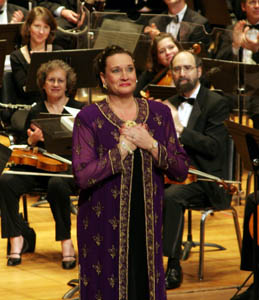 |
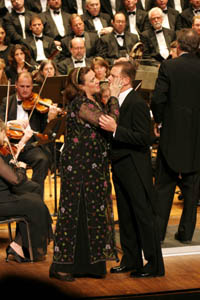 |
“If there had been any scenery, these performers would have chewed it to bits well before the last act. Livengood's Dalila was the sine qua non. She has the vocal chops, from ringing high notes to a baritonal growl. …The incomparable phrasing and warmth you hear on Maria Callas’s recordings make any resistance impossible. Livengood was more commanding than insinuating, a powerhouse who exuded sex and malevolence—hilarious and frightening and riveting.” Read the full review of that concert here.
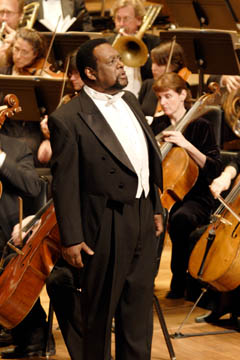 |
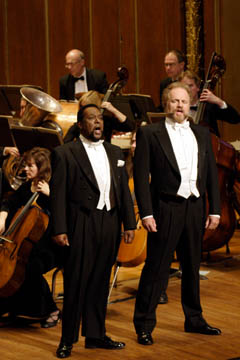 |
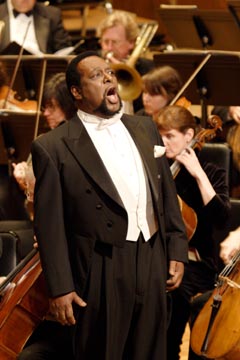 |
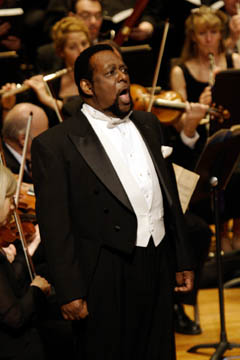 |
“In a cast of singers with the classiest credentials—Metropolitan Opera, New York City Opera, Covent Garden, Bayreuth—the only one who gave me chills was Boston's own Robert Honeysucker, whose suave and ringing baritone just gets more beautiful and powerful.” Read the full reviews of that concert here.
 |
 |
“I have seen soprano Nouné Karapetian sing twice before and on each occasion have commented about her clear vocal line, wonderful technique and pleasing, flawless delivery. Yesterday’s performance contained all that and a good deal more: Ms. Karapetian can also act and flirt and dazzle when on stage and her Nedda did all that to the immense pleasure of the audience. Her performance was mesmerizing.” —Paul Joseph Walkowski, OperaOnline.us, reviewing the Granite State Opera’s 2007 Pagliacci. Click for a Nouné Karapetian Media Kit.
Libretto by Henry Meilhac and Ludovic Halévy, based on Prosper Mériméee’s story, “Carmen”.
(Prosper Mériméee’s original story is
available as a PDF file—only about 30 double-sided pages.)
FIRST PERFORMED AT THE OPÉRA-COMIQUE, PARIS, MARCH 3, 1875.
DON JOSÉ, Corporal of Dragoons. ESCAMILLO, Toreador. ZUNIGA, Captain of Dragoons. MORALES, Officer. LILLAS PASTIA, Innkeeper. CARMEN, a Gypsy-girl. MICAELA, a Village maiden. FRASQUITA & MERCEDES, Companions of Carmen. EL DANCAÏRO & EL REMENDADO, Smugglers. A GUIDE. Dragoons, Gypsles, Smugglers, Cigarette-girls, Street-boys, etc.
The scene of the opera is Sevilla and environs; the time, 1820.
Morales, officer of dragoons, is lounging, with the soldiers of the guard, in front of the guard-house, watching the people come and go. Among them he notices a maiden, Micaela, whose shy glances betray an interest in the soldiers. Questioning her, he finds that she wishes to see Don José, a corporal in the regiment; she then evades his pressing attentions and leaves the square. The relief-guard, with Don José and his captain, Zuniga, appears, and the other guard marches off. Now, at the stroke of noon, the cigarette-girls pour out from the adjacent tobacco factory; last of all comes Carmen, the beautiful, bold, heartless Gypsy girl. Scoffing at the gallants who crowd around to seek her favor, her eye chances to light on Don José, still quite oblivious of her presence. He takes her fancy; after momentary hesitation she approaches him, throws him a nosegay, and, with a passionate glance, turns and flees. Don José, amazed and, against his will, flattered by such a token of partiality, is presently surprised by his village sweetheart, Micaela, who brings a message from his mother, exhorting him to be true to his first love. Micaela discreetly withdraws while Don José reads the letter; filled with tender thoughts of earlier days, he would renounce the fitful passion inspired by Carmen; but a sudden disturbance breaks in upon this softer mood; Carmen has wounded one of her companions in a quarrel, and Don José himself is commissioned by Zuniga to arrest her and take her to jail. But her passionate wiles overbear his good resolutions; he lets her escape, and is punished by imprisonment.
Act II plays in a suburban resort of smugglers, of whom Carmen is a faithful ally. Here she had promised to meet Don José; just now she is passing the time agreeably in the company of Zuniga and other officers. Escamillo, a redoubtable toreador, joins them, and falls in love with Carmen, who repulses his advances. Two Gypsies, leaders of the smugglers, enter to inform Carmen and her two companions Frasquita and Mercedes that their aid is needed, the same evening, to pass some “merchandise.” Carmen, awaiting Don José, who has just been set at liberty, refuses to go. He comes; the rest retire, leaving him alone with Carmen, who, enchanted at recovering her lover, employs all her art to entertain and fascinate him. But, of a sudden, he hears distant bugles sounding the retreat, realizes that he will be treated as a deserter if absent without leave, and, despite Carmen’s astonishment and growing disdain and fury, is in the act of departing, when the door is forced by Zuniga. He peremptorily orders Don José to be gone, who as haughtily refuses to yield to his rival; swords are drawn, but Carmen summons the Gypsies from their hiding-places. Zuniga is disarmed and Don José is forced, as an open mutineer against his superior officer, to leave Sevilla and join the smugglers.
In Act III the band is assembled within a wild mountain gorge, waiting to carry their bales into the city. Don José is also there, but he takes no interest in their enterprise, and bitter regrets continually assail him. Carmen, already tired of her half-hearted lover, tauntingly advises him to go back to his mother; she persists in tormenting him, although the cards, in which she implicitly believes, foretell that she is doomed to the speedy death which his gloomy looks presage. The band departs, leaving Don José to mount guard over goods left behind for another trip. Micaela, unseen by him, approaches; she catches sight of Don José, but at the same instant he levels his carbine and fires in her direction. Overcome by fright, she swoons and sinks down behind the rocks. The shot, however, was aimed at Escamillo. He clambers unharmed over the rocks and introduces himself to Don José, whose pleasure at their meeting is quickly turned to bitterest hatred when Escamillo nonchalantly announces his errand: to meet his sweetheart, Carmen. A terrible duel ensues, fought with the deadly navajas (large, keen-bladed clasp knives). Escamillo’s life is saved by the unexpected intervention of Carmen, whose love is now wholly transferred to him; he leaves the scene defiantly. The smugglers are about to follow when they espy Micaela, who, awakened from her swoon, implores Don José to hasten to his dying mother. Unable to resist this appeal, he goes but warns Carmen that they will meet again elsewhere.
The scene of Act IV is another square in Sevilla, before the ancient amphitheatre in which the bull fights are held. Last in the brilliant procession formed by the participants in the combat comes Escamillo and with him Carmen, radiant with delight in her latest conquest. Her friends warn her to go away, telling her that Don José is lying in wait. She does not heed the warning. The two meet. Don José is in no murderous mood; for the time, love has wholly gained the mastery. He implores Carmen to be his, even promises to rejoin the band of smugglers for her sake. She repels him with inflexible determination; laughs him to scorn, and throws at his feet the ring he had given her; fearlessly confronting his rising fury, she tells him that all is over between them, that Escamillo is everything to her, and that, though she feels that death is near, she will love him to her last breath. Exulting in the outburst of applause from the arena that tells of Escamillo’s triumph, she attempts to join him; but Don José, maddened by jealousy, seizes her and stabs her to the heart at the very moment when Escamillo, flushed by victory, issues from the amphitheatre with the exultant throng.
Synopsis adapted from the G. Schirmer opera score edition of Carmen.
| CpM Home | Top | Buy Tickets |